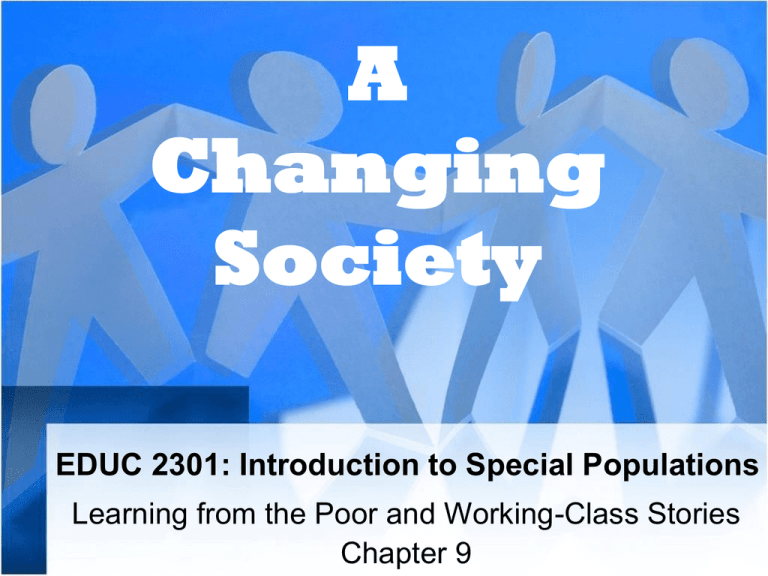
A
Changing
Society
EDUC 2301: Introduction to Special Populations
Learning from the Poor and Working-Class Stories
Chapter 9
CULTURAL FACTOR 1: HISTORICAL AND
CURRENT TREATMENT IN THE UNITED STATES
• Because the colonists came from a hierarchical
society, they apparently saw nothing particularly
problematic about some people working, even in
bondage as indentured servants, for the well-being of
others.
• In the United States most people want to believe that
they are members of the middle class and, in fact,
often identify themselves as such. However, the
income for middle class families ranges between
$25,000 and $100,000 which clearly represents a wide
variety of economic well-being and security.
©2012 Cengage Learning.
All Rights Reserved.
Current Conditions
• There are enormous differences in the economic status
and conditions of U.S. residents
• 46.2 (increase by 2.6 million in last year) million U.S.
residents are poor. (2010 statistics)
• One out of every four children is born into poverty.
• For a family of 4, this means earning $22,300 or less
• Families holding the top 1 percent of the country's
wealth doubled their share of wealth in the last 30
years.
• Nearly every Dallas neighborhood high school in 2009,
less than 20% of students prepared for college:
Adamson, Thomas Jefferson, Kimball, Pinkston,
Roosevelt, Samuell, A Maceo Smith, South Oak Cliff,
©2012 Cengage Learning.
Spruce
All Rights Reserved.
CULTURAL FACTOR 2: INITIAL TERMS OF
INCORPORATION INTO U.S. SOCIETY
• Class differences affect how much time it takes to
accomplish daily tasks in life (for example, doing
laundry, shopping for food and clothing, travel,
treatment for illness, and child care).
• Class differences determine where one lives, how one
is educated, who one's friends are, what one does for a
living, and even what one may expect out of life.
©2012 Cengage Learning.
All Rights Reserved.
CULTURAL FACTORS 3 & 4: SHARED VALUES,
AND SPIRITUALITY
• The poor typically share a preference for (1) presenttime orientation, (2) action versus reflection, (3) linear
social relations, and (4) subjugation to or at least
harmony with nature.
• In addition, working-class and poor individuals may
value tightly knit family life and conventionality.
• They are said to embrace a type of solidarity and to
share ambitious attitudes toward education but may
demonstrate resistance to dominant-culture values that
underlie certain school practices.
©2012 Cengage Learning.
All Rights Reserved.
CULTURAL FACTOR 5: ACCULTURATION
AND EXPERIENCE WITH EXCLUSION AND
ALIENATION
• Members of this group excluded in numerous ways in
schools and society as seen in the media.
• Through the inequality of resources and practices in schools
through the unequal treatment of children of varying
backgrounds within the same schools, schooling teaches
children their so-called “place” in society.
• The gradual accumulation of differential experience in
schools leads mainstream children to believe that education
will ultimately bring rewards and success, while non
mainstream children frequently come to view education as a
humiliating and fruitless pursuit.
©2012 Cengage Learning.
All Rights Reserved.
CULTURAL FACTOR 6: LANGUAGE
DIFFERENCES, STRENGTHS, AND CHALLENGES
• Research has demonstrated that middle-class parents
tend to talk more, have longer utterances, label more,
and provide more information about objects to their
children than do working-class and poor parents.
• Many theorists believe that this distinction of parentspeak results in middle-class students having
communication patterns that more closely match those
of middle-class teachers.
©2012 Cengage Learning.
All Rights Reserved.
Can you survive outside your class?
On 10 small slips of paper
write:
• Names of 3 persons
(each of a different slip of
paper) who have helped
you at some time in your
live either pursue a goal,
get an education or
helped you financially
• Highest level of education
you have completed and
name of school
• Your race
• Your gender
• If you own a vehicle
• Your relationship status
(married, single,
widowed, etc.)
• Number of children you
have
• Your health status (good,
fair, poor)
Ruby Payne &
Generational Poverty
• Poverty is relative and occurs among people of
all ethnic backgrounds.
• Economic class is a continuous line, not a clearcut distinction.
• Generational poverty and situation poverty are
different.
• Hidden rules of generational poverty cause
students to react in ways seen as inappropriate
for those with middle-class values.
• Schools and businesses operate from middleclass norms and use the hidden rules of middle
class
Copyright by Houghton Mifflin
4-9
Resources that influence achievement
•
•
•
•
•
•
•
•
Financial
Emotional
Mental
Spiritual
Physical
Support Systems
Role Models
Knowledge of Hidden Rules
Hidden Rules: Driving Forces
(see handout)
• Poverty
– Survival
– Relationships
– Entertainment
• Middle Class
– Work, achievement
• Wealth
– Connections – financial, political, social
Hidden Rules: Time
• Poverty
– Present most important
– Decisions made for the moment/surviving
• Middle Class
– Future most important
– Decisions made against future remifications
• Wealth
– Traditions and history most important
– Decisions partially on tradition/decorum
Hidden Rules: Power
• Poverty
– Linked to personal respect, ability to fight
– Can’t stop bad things from happening
• Middle Class
– Power/respect separated
– Power in information and institutions
• Wealth
– Power in expertise, connections
– Influences policy and direction
The Open Table Model
For Reflection and Discussion
1. From which rules of class do you typically operate?
• 2. What school practices have a hidden social-class
bias (for example, senior proms; class trips to
Washington, DC; school assignments about “What I did
on my summer vacation;” and so on)?
• 3. How do you feel about this statement? “Students
from generational poverty need direct teaching to build
cognitive structures necessary for learning. The hidden
rules must be taught so they can choose the
appropriate responses if they desire to succeed
academically.”


